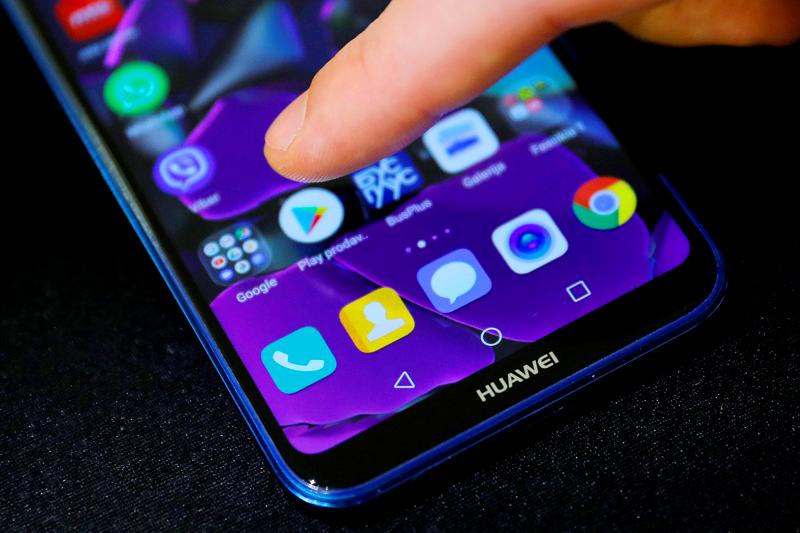A ban on Chinese-made electronics for government use took effect yesterday, with central and local government agencies reporting a near-total replacement of such devices, a source familiar with the matter said yesterday.
Speaking on condition of anonymity, the official said that only in a few cases did the Executive Yuan grant approval to certain agencies to retain electronic products made in China for training or evaluation purposes.
The source declined to elaborate on brands, models and the quantity of Chinese-made equipment still in use, citing the sensitivity of the information.

Photo: Reuters
Products by Huawei Technologies Co (華為) are under particular scrutiny due to the company’s links to the Chinese military, the source said.
Another priority is the prohibition of personal devices used in government agency networks, they said.
The administration of President Tsai Ing-wen (蔡英文) has been reticent about the prevalence of Chinese electronics in government agencies prior to the ban.
In a document dated May last year, the Executive Yuan said that 19,256 electronic devices — including 4,556 Chinese-made drones and security cameras — were utilized in 2,596 agencies, including schools.
The most prevalent Chinese manufacturers of drones and cameras in use were SZ DJI Technology Co (大疆創新), TP-Link Technologies Co (普聯技術) and Hangzhou Hikvision Digital Technology Co (海康威視), it said.
The Executive Yuan announced the ban in December 2020, citing information security concerns. It prohibits Chinese electronics from government use, personal software on work devices and personal electronics in government networks.
The Executive Yuan also said that all local and central government agencies must account for Chinese electronics used by contractors and subcontractors, urging them to replace the equipment before this year.

EUROPEAN TARGETS: The planned Munich center would support TSMC’s European customers to design high-performance, energy-efficient chips, an executive said Taiwan Semiconductor Manufacturing Co (TSMC, 台積電), the world’s largest contract chipmaker, yesterday said that it plans to launch a new research-and-development (R&D) center in Munich, Germany, next quarter to assist customers with chip design. TSMC Europe president Paul de Bot made the announcement during a technology symposium in Amsterdam on Tuesday, the chipmaker said. The new Munich center would be the firm’s first chip designing center in Europe, it said. The chipmaker has set up a major R&D center at its base of operations in Hsinchu and plans to create a new one in the US to provide services for major US customers,

The Ministry of Transportation and Communications yesterday said that it would redesign the written portion of the driver’s license exam to make it more rigorous. “We hope that the exam can assess drivers’ understanding of traffic rules, particularly those who take the driver’s license test for the first time. In the past, drivers only needed to cram a book of test questions to pass the written exam,” Minister of Transportation and Communications Chen Shih-kai (陳世凱) told a news conference at the Taoyuan Motor Vehicle Office. “In the future, they would not be able to pass the test unless they study traffic regulations

GAINING STEAM: The scheme initially failed to gather much attention, with only 188 cards issued in its first year, but gained popularity amid the COVID-19 pandemic Applications for the Employment Gold Card have increased in the past few years, with the card having been issued to a total of 13,191 people from 101 countries since its introduction in 2018, the National Development Council (NDC) said yesterday. Those who have received the card have included celebrities, such as former NBA star Dwight Howard and Australian-South Korean cheerleader Dahye Lee, the NDC said. The four-in-one Employment Gold Card combines a work permit, resident visa, Alien Resident Certificate (ARC) and re-entry permit. It was first introduced in February 2018 through the Act Governing Recruitment and Employment of Foreign Professionals (外國專業人才延攬及雇用法),

‘A SURVIVAL QUESTION’: US officials have been urging the opposition KMT and TPP not to block defense spending, especially the special defense budget, an official said The US plans to ramp up weapons sales to Taiwan to a level exceeding US President Donald Trump’s first term as part of an effort to deter China as it intensifies military pressure on the nation, two US officials said on condition of anonymity. If US arms sales do accelerate, it could ease worries about the extent of Trump’s commitment to Taiwan. It would also add new friction to the tense US-China relationship. The officials said they expect US approvals for weapons sales to Taiwan over the next four years to surpass those in Trump’s first term, with one of them saying